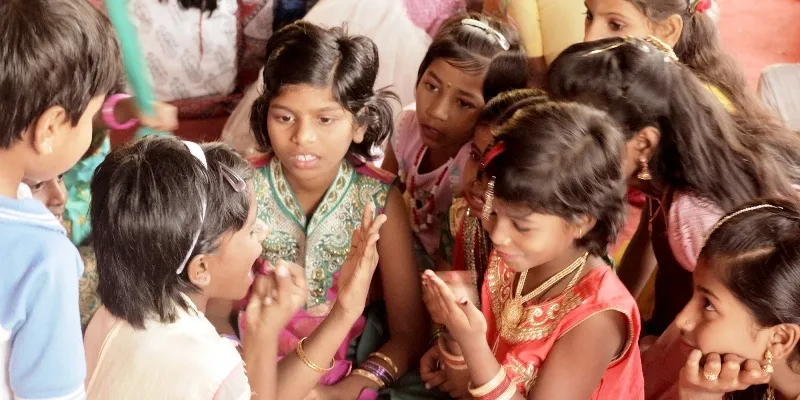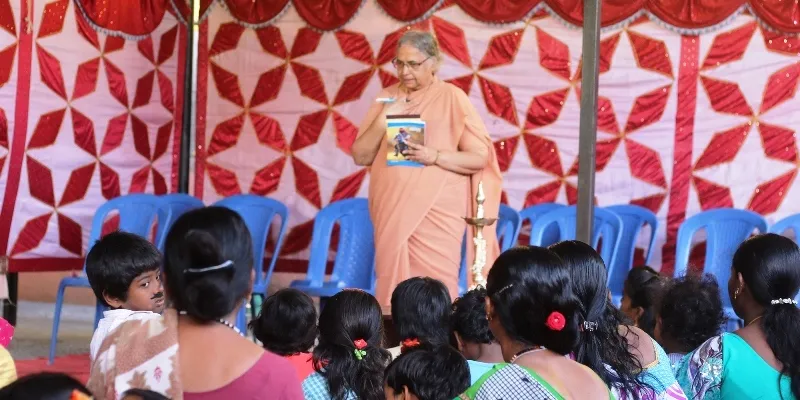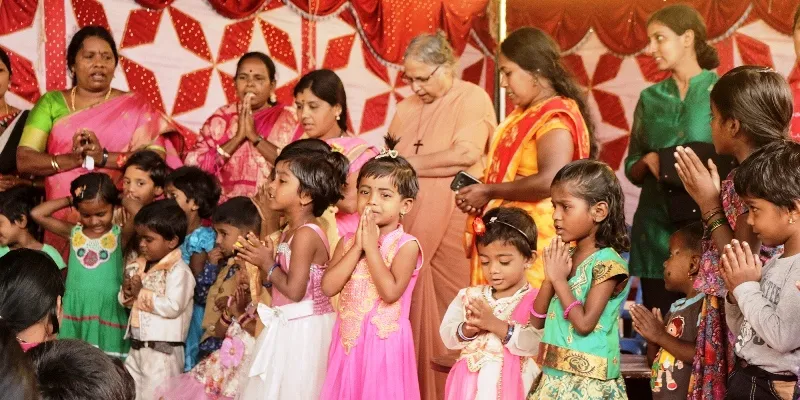For over 17 years, this organisation has been lending a helping hand to underprivileged mothers
The Navajeevan Mahila Pragati Kendra, along with Rotary Bengaluru Lakeside, has established eight creches in and around Bengaluru. This lets daily wagers and domestic workers take up jobs without worrying about their children.

In a tiny hutment in a slum in Jayaraj Nagar, Bengaluru, a young child weeps as he struggles to break free of the rope that binds his wrist to the window grill. The leash is the only way the mother, a domestic worker, can ensure that her child doesn't run away. This is a common sight in underprivileged homes, in urban and rural areas.
But if mothers have to stay at home to care for the child, it puts added pressure on the sole earning member of the family. With lesser income, malnourishment and illiteracy among their children go on the rise.
Both these scenarios highlight a vicious cycle.
It was the plight of children who were left alone and the need to offer a helping hand to mothers that prompted Nava Jeevan Mahila Pragathi Kendra (NJMPK) to open creches in slum areas. The initiative seeks to allow mothers to make a living, be independent, and help their children thrive in a healthy environment that offers education.
In the beginning
Sister Elise Mary (70), decided to become a nun at the age of 17; she was driven to dedicate her life to the poor, a trait she had imbibed from her mother. She was keen to serve underprivileged, exploited, and oppressed families, especially women and children. This motivated her to start Nava Jeevan Mahila Pragathi Kendra, a social service centre, in 1999.
In response to the needs of the rural and urban poor, especially the women, the centre began organising and monitoring self-help groups in Bengaluru rural, Anekal, and Bengaluru urban districts. By 2002, NJMPK had 450 self-help groups in all three districts. The centre then expanded and began programmes for self-employment of women, and worked on health awareness for mothers. They also began assisting husbands with alcoholic addictions, led an income generation programme, organised health camps, and set up a task unit.
Recalling the initial struggles, Sister Elise says, “People from villages thought we were trying to convert them; there was strong opposition. What helped change this wrong idea was when we took on board volunteers from different religions. Once people gained confidence in our work, people from other neighboring villages would come and invite us to work in their villages.”

Supporting women
NJMPK gave underprivileged women a voice. They were made aware of many things they were clueless about - how to get water for their homes, apply for a loan, and open a bank account.
“Our initiatives showed tremendous results. These women, who only had the courage to speak up behind four walls, began coming together in groups to fight for their rights and discuss their issues with us. This was what opened our eyes to an important issue,” she says.
When the underprivileged women, mostly domestic workers, vegetable vendors, daily wage earners and those at construction sites, expressed their daily worries and problems at not being able to care for their children while at work, NJMPK - supported by Rotary Bengaluru Lakeside - established Bengaluru’s first creche for the children of these women in 2001.
Jayanta Tewari, President Elect 2018-2019, Rotary Bangalore Lakeside, says: “Our motive was to support these women by helping them earn their livelihood with the security of the creche making their life easy. During working hours, their children are cared for.”
A home for learning
After sensing the needs of other slums, NJMPK selected areas that had a high concentration of domestic and daily wage workers and set up seven creches in and around Bengaluru, including a latest addition in the Iblur slum area.
Explaining the daily routine at the creche, Jayanta says each day includes various activities and events planned by the coordinator and staff. “A usual day begins at 9 am. The children start their classes with the common prayer. Following this, they are taught rhymes and alphabets, and are given ragi malt and snacks. The day continues with a focus on basic education and general knowledge.”
Each creche has two trained women teachers who collaborate with the creche coordinator, incorporating new things in the curriculum each day. This contributes to “moulding the character and behaviour of the children”, she says.
But what the kids look forward to most is the hot meal served at noon. “We have a menu for each day of the week; this gets the children excited. After a nutritious meal, the children take a nap and wake up in time for their mothers to come pick them up.”
With personal care such as this there has been marked improvement in the children’s well being, health, and cleanliness. Over time, parents have witnessed a positive change in their mental health as well. Most children are supported till they are admitted to a primary school in the community.
“Over 20 children have completed their graduation and a few have become engineers and dentists. Many others have found decent jobs,” says Jayanta.
Benefits for parents
Apart from being a full-day care centre for the children, the creche also provides multiple benefits to the parents. Through parent and teacher meetings, parents are introduced to innovative programmes and awareness talks.
“We also conduct input sessions for the welfare of the children; this leads to fruitful discussions and the mothers opening up to us,” Jayanta says.
Since the teachers are closely associated with the mothers, they give proper guidance and timely instructions for the welfare of the children and family. Life skill education, family life education, women empowerment, and child care topics are discussed regularly.
“They always look forward to this monthly get-together. Additional benefits for the parents enrolling their children include counselling for the mothers who need emotional and other support. When it can, the creche also helps a few parents find employment,” Jayanta adds.

Raising funds
At present, NJMPK is aiding 350 families through the creche initiative. However, the cost of running a creche is close to Rs 50,000 a month. Lack of funds has forced the organisation to stop many of its earlier projects.
“We are in dire need of funds to get back up and going, even more fiercely than before. We have taken to the route of crowdfunding to gain more popularity and give our projects a wider visibility,” Jayanta says.
To fund their latest creche at Iblur, NJMPK and Lakeside Rotary have launched a crowdfunding campaign. The campaign aims to raise Rs 1.92 lakh to ensure the smooth running of the Iblur creche for four months.
For over 17 years, this organisation has also been running a home for 15 destitute girls who are provided with education and recreational facilities.
In the future, NJMPK wants to continue to help ease the lives of women. The centre plans to rehabilitate alcoholic men through intense interaction and close collaboration with family members, giving these women a chance at a happy family and future.







